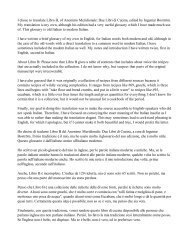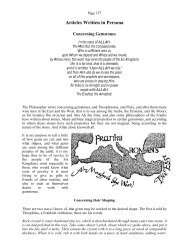How to Milk an Almond Stuff an Egg And Armor a Turnip A ...
How to Milk an Almond Stuff an Egg And Armor a Turnip A ...
How to Milk an Almond Stuff an Egg And Armor a Turnip A ...
You also want an ePaper? Increase the reach of your titles
YUMPU automatically turns print PDFs into web optimized ePapers that Google loves.
Two reference books that we have found helpful are the Larousse Gastronomique <strong>an</strong>d the<br />
Oxford English Dictionary. The former is a dictionary of cooking, available in both English <strong>an</strong>d<br />
French editions. The latter, which is also useful for m<strong>an</strong>y other sorts of SCA research, is the<br />
st<strong>an</strong>dard English scholar's dictionary; it contains a much more extensive r<strong>an</strong>ge of obsolete words<br />
<strong>an</strong>d me<strong>an</strong>ings th<strong>an</strong> <strong>an</strong> ordinary dictionary. Also, Two Fifteenth Century Cookbooks <strong>an</strong>d Curye on<br />
Inglysch contain glossaries.<br />
An approach <strong>to</strong> developing recipes that we have found both productive <strong>an</strong>d entertaining is <strong>to</strong><br />
hold cooking workshops. We select recipes that we would like <strong>to</strong> try or retry <strong>an</strong>d invite <strong>an</strong>yone<br />
interested <strong>to</strong> come help us cook them. The workshop starts in the afternoon. As each person<br />
arrives, he chooses a recipe <strong>to</strong> do. We suggest that people who have not cooked from period<br />
recipes before do new recipes so that they c<strong>an</strong> have the experience of working directly from <strong>an</strong><br />
un<strong>to</strong>uched original. The details of how the recipe is being prepared–qu<strong>an</strong>tities, temperatures,<br />
times <strong>an</strong>d techniques–are written down as the dish is prepared. The afternoon <strong>an</strong>d early evening<br />
are spent cooking, eating, <strong>an</strong>d discussing how <strong>to</strong> modify the recipes next time; we offer <strong>an</strong>yone<br />
who wishes copies of the recipes <strong>to</strong> experiment with further at home. M<strong>an</strong>y of the recipes in this<br />
book were developed at such sessions. We have never yet had <strong>to</strong> send out for pizza.<br />
136<br />
Tourney <strong>an</strong>d War Food<br />
Suppose you are going <strong>to</strong> a <strong>to</strong>urnament <strong>an</strong>d w<strong>an</strong>t <strong>to</strong> bring period food <strong>to</strong> eat <strong>an</strong>d share during<br />
the day. Suppose you are going <strong>to</strong> a camping event, such as the Pennsic war, <strong>an</strong>d expect <strong>to</strong> be<br />
encamped for something between a weekend <strong>an</strong>d two weeks. What period foods are likely <strong>to</strong><br />
prove useful?<br />
For both one day events <strong>an</strong>d wars, we have accumulated a small collection of period foods <strong>an</strong>d<br />
drinks that c<strong>an</strong> be made in adv<strong>an</strong>ce <strong>an</strong>d kept without refrigeration for <strong>an</strong> almost unlimited period<br />
of time. They include Hulwa (p. 121), Hais (p. 117), Prince-Bisket (p. 46), Gingerbrede (p. 46),<br />
Excellent Cake (p. 47; this is actually slightly out of period), Khushk<strong>an</strong><strong>an</strong>aj (p. 116), Sek<strong>an</strong>jabin<br />
(p. 125) <strong>an</strong>d Syrup of Pomegr<strong>an</strong>ate (p. 125). The last two are drinks that are prepared as syrups<br />
<strong>an</strong>d diluted (with cold water for sek<strong>an</strong>jabin <strong>an</strong>d hot water for gr<strong>an</strong>atus) just before being served.<br />
The syrups are sufficiently concentrated so that, like honey or molasses, they keep indefinitely.<br />
For a one day event we will often also bring a cold meat or cheese pie; Spinach Tart (p. 41) is<br />
one of our favorites. In addition, one c<strong>an</strong> bring bread, cheese, sausage, nuts, dried fruit–all things<br />
which were eaten in period <strong>an</strong>d c<strong>an</strong> keep for a reasonable length of time.<br />
A camping event, especially one more th<strong>an</strong> two days long, raises a new set of challenges <strong>an</strong>d<br />
opportunities–period cooking with period equipment. One of the associated problems is how <strong>to</strong><br />
keep perishable ingredients long enough so that you c<strong>an</strong> bring them at the beginning of the event<br />
<strong>an</strong>d use them at the end. One could keep things in a cooler with lots of ice–especially at Pennsic,<br />
where ice is available <strong>to</strong> be bought. This is, however, a considerable nuis<strong>an</strong>ce–<strong>an</strong>d besides, it is<br />
unlikely that either coolers or ice were available at a real medieval war.<br />
Better solutions are <strong>to</strong> choose dishes that do not require perishable ingredients or <strong>to</strong> find<br />
period ways of preserving such ingredients. One of our future projects along these lines is <strong>to</strong> work<br />
out some good recipes for salted or dried fish, which was <strong>an</strong> import<strong>an</strong>t food in the Middle Ages<br />
<strong>an</strong>d one that keeps indefinitely. Our most successful preserving technique so far is <strong>to</strong> pickle meat<br />
or fowl using Lord's Salt (p. 74). The pickled meat is strongly flavored with vinegar <strong>an</strong>d spices,<br />
so we pick a recipe <strong>to</strong> use it in that contains vinegar or verjuice in its list of ingredients. We wash<br />
most of the pickling solution off the meat <strong>an</strong>d make up the recipe omitting the sour ingredient<br />
(<strong>an</strong>d <strong>an</strong>y spices that are already in the pickled meat). Two recipes that work well with pickled<br />
chicken are Veal, Kid, or Hen in Bokenade (p. 27) <strong>an</strong>d Conyng, Hen, or Mallard (p. 29).





